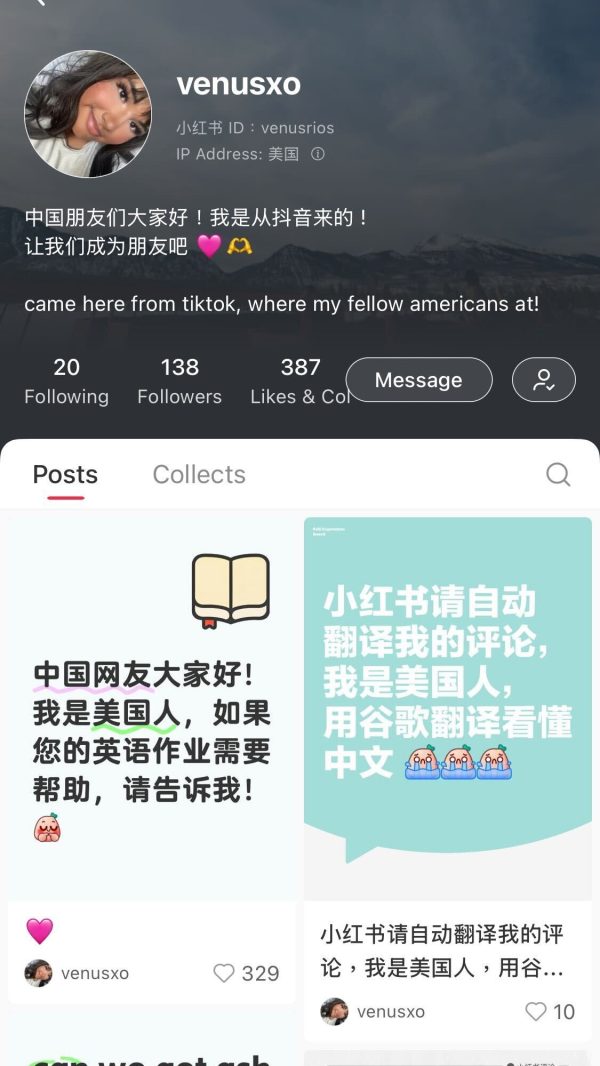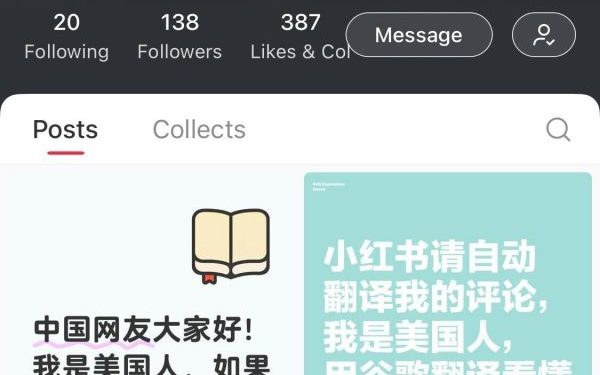Venus Rios, an American high school student, sparked a wave of discussion when she posted this week on the Chinese social media platform XiaohongshuXiaohongshuXiaohongshu, which translates to “little red book” in Chinese, is a lifestyle e-commerce and social media platform.LEARN MOREwritten in Chinese characters.
“Hello Chinese Internet users! I’m American, if you need help with your English homework, please let me know! In one day, the 17-year-old received nearly 2,000 comments.
Rios is among thousands of “TikTok refugees” who flocked to Xiaohongshu after calls from TikTok influencers to migrate to the app to show their opposition to the US government’s crackdown on TikTok. The US Supreme Court has yet to rule on a law requiring TikTok to spin off its parent company ByteDance by January 19 or face a ban in the US.

Venus Rios
Dubbed “RedNote” by TikTokers, Xiaohongshu, which had not previously targeted U.S. users, was the most downloaded app on Apple’s U.S. App Store on Tuesday. For Rios, using the app is more than an act of rebellion, she said Rest of the world.
“I just wanted something that could replace TikTok, and it was also kind of an act of protest against our government,” the Texan said..
Xiaohongshu, meaning “Little Red Book,” is one of the most popular social networks in China. Her feed features an endless scroll of Instagram-style posts, powered by personalized TikTok-style recommendations. Xiaohongshu users, most of whom are young women, typically use the app to exchange advice on travel, shopping and other lifestyle topics. It has over 300 million monthly active users.
Xiaohongshu did not respond to Rest of the worldrequest for comments from , including on the latest count of foreign users.
As of Tuesday morning, there were at least 58,000 posts related to “TikTok refugee” on the app’s search engine. A chat room called “TikTok Refugees Home” streamed live for hours on Monday, attracting more than 727,300 participants.
Unlike ByteDance which created a separate app, TikTok, for users outside China, Xiaohongshu focuses primarily on Chinese users and adheres to Beijing’s strict censorship rules. TikTok’s Chinese sister app Douyin is not available for download in the US
Although Xiaohongshu is widely used by overseas Chinese, the platform has made limited efforts to attract a broader international user base. Even Xiaohongshu’s logo is designed with the Chinese characters of its name. It offers no in-app translation for user posts or comments and only suggests Chinese keywords in its search bar.
Today, the sudden influx of American users to Xiaohongshu has created an unusual exchange space between Chinese and American users. Over the past few days, they’ve exchanged cat memes, shared photos of their hometowns, and touched on thorny topics like racism, transgender rights, and Luigi Mangione.
“I think Xiaohongshu is the Chinese app closest to American internet culture,” said Roger Huang, a Mandarin-speaking Canadian author who signed up for Xiaohongshu in 2020 to learn about Chinese consumer trends. . Rest of the world. “If a group of Americans showed up on WeChat, they would be totally lost,” he said, referring to the ubiquitous instant messaging app in China.

Interactions between U.S. and Chinese users could have lasting positive implications, Huang said. “It might help more Americans realize that Shanghainese are not that different from New Yorkers.” It would be healthy for the US-China discourse in general.»
But the sudden increase in U.S. users likely poses new challenges for Xiaohongshu, as the platform tries to balance global business expansion with pressure to enforce China’s censorship laws.
China’s internet censorship system – often called “the Great Firewall” – blocks content deemed sensitive, such as discussions of LGBTQ issues, street protests and Chinese leaders. American media platforms like Facebook, Instagram and X are banned in China, while popular Chinese social media platforms like WeChat and Weibo are relatively complex and difficult for foreigners to navigate.
In China, Internet users must register on social networks under their real name. Violations of content rules could result in account bans or legal repercussions, including prison time. People have learned to avoid sensitive topics or adopt euphemisms.
American TikTokers didn’t seem to know or care about these rules. Their posts on Xiaohongshu range from seeking opinions on the war in Ukraine to homosexuality to the Chinese government – topics that often trigger censorship in China. In the comments, some Chinese users reminded newcomers not to discuss “politics, religion and drugs.”
Xiaohongshu’s censorship system is likely heavily questioned, according to Eric Liu, a former content moderator for Weibo and currently a U.S.-based editor at The digital age in Chinasaid Rest of the world.
“The fact that the Americans are using Xiaohongshu is already on the red line,” Liu said. “This is something that cannot last because Americans do not practice self-censorship.” To comply with Chinese law, the app may have to create a wall between domestic and foreign users, as ByteDance did with TikTok and Douyin, he added.
As the influx of Americans pushes Xiaohongshu to clarify its international strategy, creating a separate app for international users will expose it to the same scrutiny TikTok faces in the West, believes Sheng Zou, an assistant professor at the Hong Kong School of Communication. Baptist University, said Rest of the world.

“The platform needs to determine how global it wants to be, how it wants to position itself and what its globalization or internationalization development plan is in the coming years,” said Zou, who researches media social and popular culture.
Ultimately, it’s up to users to determine whether they want to be subject to Chinese censorship, he added. Rios, who said she didn’t expect to spend so much time chatting with Chinese users, isn’t too worried.
“If they think China is that interested in our data, I’d rather give it to them directly,” she said. “I don’t think China cares what I do, I think it’s just a way (for the US government) to control us.”
But not all Chinese users are happy. Lin, a 28-year-old Chinese Xiaohongshu user, initially found chatting with American users “refreshing,” but she soon grew tired of the language and cultural barriers that led to stilted conversations, she said. she declared. Rest of the world.
“Xiaohongshu is by nature a Chinese-speaking community… it’s a bit like a Chinese cultural circle in which it’s difficult to integrate foreigners,” said Lin, who only gave his last name by fear of repercussions if she spoke to foreign media.
Ahead of the Supreme Court’s decision, uncertainty remains over whether TikTok will be banned. Some U.S. companies have expressed interest in purchasing TikTok, while Chinese officials are evaluating a potential option involving Elon Musk’s acquisition of the company, according to a Bloomberg report.
For now, Americans like Rios still enjoy exploring Xiaohongshu. Some use the app’s powerful algorithm to find Chinese users sharing their hobbies specializing in bird watching, crochet, musical theater and League of Legends.
Other users are taking the opportunity to poke fun at U.S. security concerns, with some Americans posting variations of the joke: “Hey, looking for my Chinese spy,” and some Chinese users replying, “Who am I?” call? I’m coming!”


